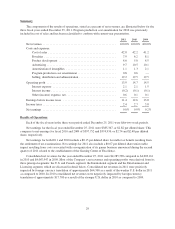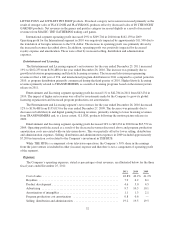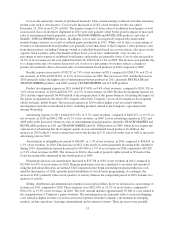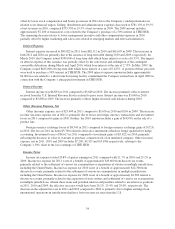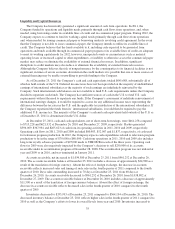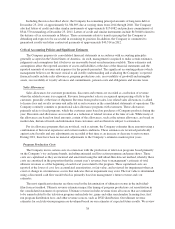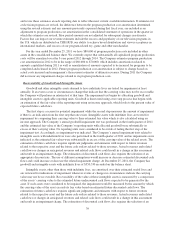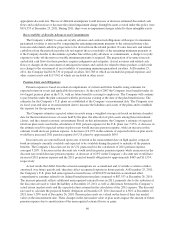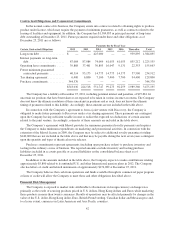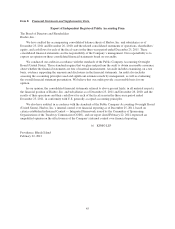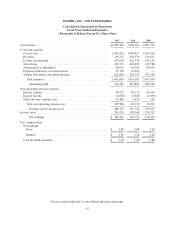Hasbro 2011 Annual Report Download - page 48
Download and view the complete annual report
Please find page 48 of the 2011 Hasbro annual report below. You can navigate through the pages in the report by either clicking on the pages listed below, or by using the keyword search tool below to find specific information within the annual report.
and revise these estimates at each reporting date to reflect the most current available information. If estimates for
a television program are revised, the difference between the program production cost amortization determined
using the revised estimate and any amounts previously expensed during that fiscal year, are included as an
adjustment to program production cost amortization in the consolidated statement of operations in the quarter in
which the estimates are revised. Prior period amounts are not adjusted for subsequent changes in estimates.
Factors that can impact our revenue estimates include the success and popularity of our television programs in
the U.S. which are distributed on THE HUB, our ability to achieve broad distribution and viewer acceptance in
international markets, and success of our program-related toy, game and other merchandise.
For the year ended December 25, 2011 we have $80,600 of program production costs included in other
assets in the consolidated balance sheet. We currently expect that substantially all capitalized program production
costs will be amortized over the 3-year period 2012 through 2014. The Company estimates program production
cost amortization in 2012 to be in the range of $60,000 to $70,000, which includes amortization related to
amounts capitalized during 2011 as well as amortization of amounts expected to be incurred for programs to be
completed and released in 2012. Future program production cost amortization is subject to change based on
actual costs incurred and management’s then current estimates of ultimate revenues. During 2011 the Company
did not incur any impairment charges related to its program production costs.
Recoverability of Goodwill and Intangible Assets
Goodwill and other intangible assets deemed to have indefinite lives are tested for impairment at least
annually. If an event occurs or circumstances change that indicate that the carrying value may not be recoverable,
the Company will perform an interim test at that time. The impairment test begins by allocating goodwill and
intangible assets to applicable reporting units. Goodwill is then tested using a two step process that begins with
an estimation of the fair value of the reporting unit using an income approach, which looks to the present value of
expected future cash flows.
The first step is a screen for potential impairment while the second step measures the amount of impairment
if there is an indication from the first step that one exists. Intangible assets with indefinite lives are tested for
impairment by comparing their carrying value to their estimated fair value which is also calculated using an
income approach. The Company’s annual goodwill impairment test was performed in the fourth quarter of 2011
and the estimated fair value of the Company’s reporting units with allocated goodwill were substantially in
excess of their carrying value. No reporting units were considered to be at risk of failing the first step of the
impairment test. Accordingly, no impairment was indicated. The Company’s annual impairment tests related to
intangible assets with indefinite lives were also performed in the fourth quarter of 2011 and no impairments were
indicated as the estimated fair values were substantially in excess of the carrying value of the related assets. The
estimation of future cash flows requires significant judgments and estimates with respect to future revenues
related to the respective asset and the future cash outlays related to those revenues. Actual revenues and related
cash flows or changes in anticipated revenues and related cash flows could result in a change in this assessment
and result in an impairment charge. The estimation of discounted cash flows also requires the selection of an
appropriate discount rate. The use of different assumptions would increase or decrease estimated discounted cash
flows and could increase or decrease the related impairment charge. At December 25, 2011, the Company has
goodwill and intangible assets with indefinite lives of $550,530 recorded on the balance sheet.
Intangible assets, other than those with indefinite lives, are amortized over their estimated useful lives and
are reviewed for indications of impairment whenever events or changes in circumstances indicate the carrying
value may not be recoverable. Recoverability of the value of these intangible assets is measured by a comparison
of the assets’ carrying value to the estimated future undiscounted cash flows expected to be generated by the
asset. If such assets were considered to be impaired, the impairment would be measured by the amount by which
the carrying value of the asset exceeds its fair value based on estimated future discounted cash flows. The
estimation of future cash flows requires significant judgments and estimates with respect to future revenues
related to the respective asset and the future cash outlays related to those revenues. Actual revenues and related
cash flows or changes in anticipated revenues and related cash flows could result in a change in this assessment
and result in an impairment charge. The estimation of discounted cash flows also requires the selection of an
39


